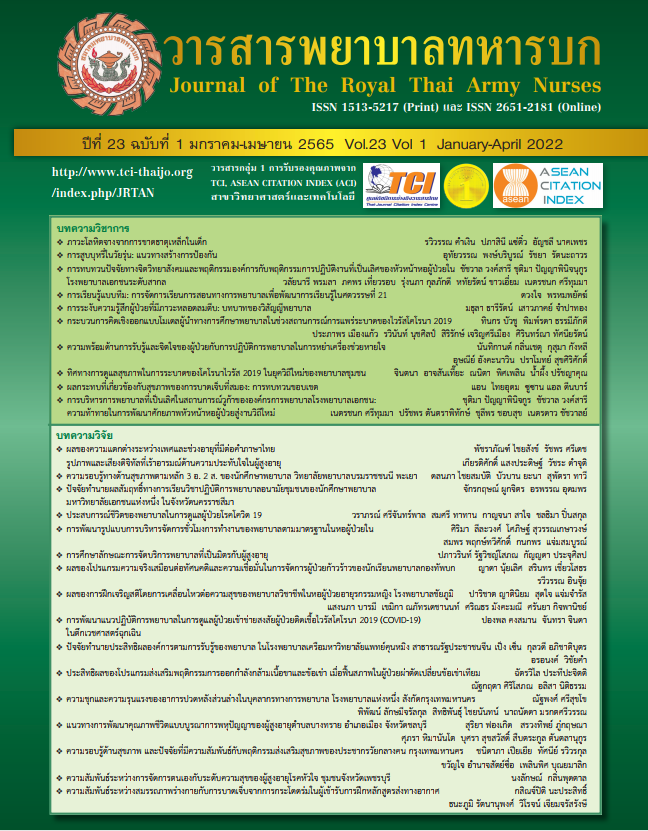Effects of A Self-Efficacy Program using Tai Chi to Prevent Elderly Fall in Flat Communities
Keywords:
Fall Prevention Program, Perceived Self-Efficacy, Tai-Chi Exercise, Balance, ElderlyAbstract
This quasi-experimental research aimed to explore the effects of a self- efficacy program using Tai Chi to prevent elderly fall, on leg muscle strength and balance; among the elderly in flat communities. The sample was 60 of males and females aged 60 - 69 years, randomly selected into the experimental group and the comparison group, 30 per each. The experimental group received the self-efficacy program using Tai Chi. Data collected by using interview questionnaires, testing leg muscle strength, and balance. Data analyzed by using descriptive statistics, Chi-square, and t-test. The result showed the experimental group had significantly higher mean posttest scores for perceived self-efficacy in exercising, exercise outcome expectation, and exercise practices than pretest. Leg muscle strength and balance were better than at pretest with statistical significance at p-value < .01. The mean of different scores of perceived self-efficacy in exercise, exercise outcome expectation, exercise practices, leg muscle strength, and balance were higher than the comparison group with statistical significance at p-value < .01.
Downloads
References
Statistical Forecasting Bureau National Statistical office. The Government Complex. The 2014 Survey of the older persons in Thailand. Bangkok. Text and Journal Publication Co.Ltd. 2014. (in Thai)
World Health Organization [Internet]. Geneva: Seventy-third World Health Assembly. Decade of Healthy Ageing: The Global strategy and action plan on ageing and health 2016-2020.
Din Daeng District Office. Registration Din-Daeng District. Population of the community housing Din-Daeng Flat 1-20. Population statistics data of the Din-Daeng area. 2018. (in Thai)
Health Center 4 Din-Daeng, Health Department. Statistical data of falls in the elderly. 2017. (in Thai)
Petsanghan, U. Handbook of care for the elderly: Adjust your home to live well. The world today is happy. Vol 5-11, 2014. (in Thai)
The Selfhelp Home: A traditional of caring. The 12 Benefits of Tai Chi for Senior. Selfhelphome. org. Chicago.USA. 2019.
Harvard Medical School. The health benefits of tai chi. Harvard Women’s Health Watch. Harvard Health Publishing. 2019.
Sukarun S., Palasuwan A., Suksom D., & Anukulpracha C. Effects of applied Miracle Tai Chi training with emphasis on respiration on physical performance in elderly people. Research Fund Division Ratchadaphisek scholarship and research grant under the National University Program, Sport Science and Health 2011; 12 (3): 1-16. (in Thai)
Saenphan W., Sangkharat S, Boripantakul S., & Watcharasaksilp K. Effect of Tai Chi athome on balance in the elderly who have awareness and understanding slightly impaired. Chiang Mai Med J. 2016; 49 (1): 123-33. (in Thai)
Bandura, A. Self-efficacy In V. S. Ramachaudran (Ed.), Encyclopedia of human Behavior. New York: Academic Press. 1994 (4): 71-81.
Sirited P: Thammaseeha. Self-Efficacy Theory and Self-Healthcare Behavior of the Elderly. Journal of The Royal Thai Army Nurses 2019;20(2): 58-65. (in Thai)
Cohen, J. Statistical power analysis for the behavior sciences. 2nd. Lawrence Erlbaum Associates. New York .1988..
Racha S, Aly C, Jean-Luc N, A Systematic Review of Thirty-One Assessment Tests to Evaluate Mobility in Older Adults, Biomed Res. 2019.
Physiopedia contributors. Timed Up and Go Test (TUG) .2020.
Yingge Tong, Ling Chai, Song Lei, Miaomiao Liu, Lei Yang. Effects of Tai Chi on Self-Efficacy: A Systematic Review, Evid Based Complement Alternat Med.2018.
Chen Y-M, Li Y-P, Yen M-L. Predictors of regular exercise among older residents of long-term care institutions. Int. J. Nurs. Pract. 2016; 22: 239-246
Tasuwanin T., Tappakit.K. Effects of a Falling Prevention Program for Elderly. J. Nurs. Healthc. Res. 2017;35: 186-195.
Chanjirawadee P., Sirisopon N., Kaiaka P., Onsiri., S.The Effectiveness of a Fall Prevention Program for a Fall Prevention Behaviors in Hypertension Elderly. J Royal Thai Army Nurses. 2017.18(2):41-48 (in Thai)
Sanee A. Exercise in the Elderly: Jinkangkong Exercise. J Royal Thai Army Nurses. 2018.19(3):71-76. (in Thai)
Mahaprom. T, Monkong S. Wongvatunyu S. Tai Chi Practice and Its Impact on Elderly People’s Balance. Thai Journal of Nursing Council 2017; 32(3) 50-65. (in Thai)
Downloads
Published
How to Cite
Issue
Section
License
Copyright (c) 2022 Journal of The Royal Thai Army Nurses

This work is licensed under a Creative Commons Attribution-NonCommercial 4.0 International License.
บทความหรือข้อคิดเห็นใดใดที่ปรากฏในวารสารพยาบาลทหารบกเป็นวรรณกรรมของผู้เขียน ซึ่งบรรณาธิการหรือสมาคมพยาบาลทหารบก ไม่จำเป็นต้องเห็นด้วย
บทความที่ได้รับการตีพิมพ์เป็นลิขสิทธิ์ของวารสารพยาบาลทหารบก
The ideas and opinions expressed in the Journal of The Royal Thai Army Nurses are those of the authors and not necessarily those
of the editor or Royal Thai Army Nurses Association.






